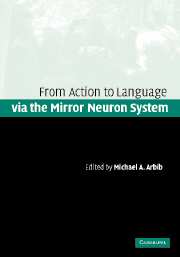Book contents
- Frontmatter
- Contents
- List of contributors
- Preface
- Part I Two perspectives
- Part II Brain, evolution, and comparative analysis
- Part III Dynamic systems in action and language
- Part IV From mirror system to syntax and Theory of Mind
- Part V Development of action and language
- 12 The development of grasping and the mirror system
- 13 Development of goal-directed imitation, object manipulation, and language in humans and robots
- 14 Assisted imitation: affordances, effectivities, and the mirror system in early language development
- 15 Implications of mirror neurons for the ontogeny and phylogeny of cultural processes: the examples of tools and language
- Index
- References
15 - Implications of mirror neurons for the ontogeny and phylogeny of cultural processes: the examples of tools and language
Published online by Cambridge University Press: 01 September 2009
- Frontmatter
- Contents
- List of contributors
- Preface
- Part I Two perspectives
- Part II Brain, evolution, and comparative analysis
- Part III Dynamic systems in action and language
- Part IV From mirror system to syntax and Theory of Mind
- Part V Development of action and language
- 12 The development of grasping and the mirror system
- 13 Development of goal-directed imitation, object manipulation, and language in humans and robots
- 14 Assisted imitation: affordances, effectivities, and the mirror system in early language development
- 15 Implications of mirror neurons for the ontogeny and phylogeny of cultural processes: the examples of tools and language
- Index
- References
Summary
Introduction
In this chapter I explore two qualities of the mirror neuron system that are critical for the evolution of tool use and language, central characteristics of human culture. The two characteristics of the mirror system are: (1) the ability of the system to respond both to one's own act and to the same act performed by another and (2) the system's selective response to intentional or goal-directed action (Fogassi et al., 2005). The ability to respond neurally both to one's own act and to the same act performed by another constitutes the neural foundation of imitation on the behavioral level (Iacoboni et al., 1999) and of repetition on the linguistic and cognitive levels (Ochs (Keenan), 1977). The selective response of the mirror neuron system to goal-directed action constitutes the neural facilitation of goal-directed action on the behavioral level and of intentionality on the cognitive level (Greenfield, 1980). My purpose is then to demonstrate the importance of these neurally grounded behavioral competencies for the evolution and ontogenetic development of two key aspects of human culture, tool use and language. In so doing, my larger goal is to contribute to understanding the neural underpinnings for the ontogeny and phylogeny of human culture.
In order to provide data on phylogeny, I draw upon my own research and that of others to compare chimpanzees (Pan troglodytes), bonobos (Pan paniscus), and humans (Homo sapiens). The Pan line and the hominid line diverged in evolutionary history approximately 5 million years ago (Stauffer et al., 2001).
Information
- Type
- Chapter
- Information
- Action to Language via the Mirror Neuron System , pp. 501 - 533Publisher: Cambridge University PressPrint publication year: 2006
References
Accessibility standard: Unknown
Why this information is here
This section outlines the accessibility features of this content - including support for screen readers, full keyboard navigation and high-contrast display options. This may not be relevant for you.Accessibility Information
- 4
- Cited by
